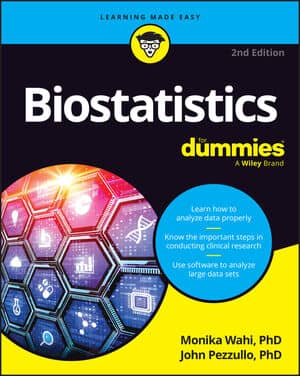Break down biostatistics, make sense of complex concepts, and pass your class
If you're taking biostatistics, you may need or want a little extra assistance as you make your way through. Biostatistics For Dummies follows a typical biostatistics course at the college level, helping you understand even the most difficult concepts, so you can get the grade you need. Start at the beginning by learning how to read and understand mathematical equations and conduct clinical research. Then, use your knowledge to analyze and graph your data. This new edition includes more example problems with step-by-step walkthroughs on how to use statistical software to analyze large datasets. Biostatistics For Dummies is your go-to guide for making sense of it all.
- Review basic statistics and decode mathematical equations
- Learn how to analyze and graph data from clinical research studies
- Look for relationships with correlation and regression
- Use software to properly analyze large datasets
Anyone studying in clinical science, public health, pharmaceutical sciences, chemistry, and epidemiology-related fields will want this book to get through that biostatistics course.
Break down biostatistics, make sense of complex concepts, and pass your class
If you're taking biostatistics, you may need or want a little extra assistance as you make your way through. Biostatistics For Dummies follows a typical biostatistics course at the college level, helping you understand even the most difficult concepts, so you can get the grade you need. Start at the beginning by learning how to read and understand mathematical equations and conduct clinical research. Then, use your knowledge to analyze and graph your data. This new edition includes more example problems with step-by-step
- Review basic statistics and decode mathematical equations
- Learn how to analyze and graph data from clinical research studies
- Look for relationships with correlation and regression
- Use software to properly analyze large datasets
Anyone studying in clinical science, public health, pharmaceutical sciences, chemistry, and epidemiology-related fields will want this book to get through that biostatistics course.

